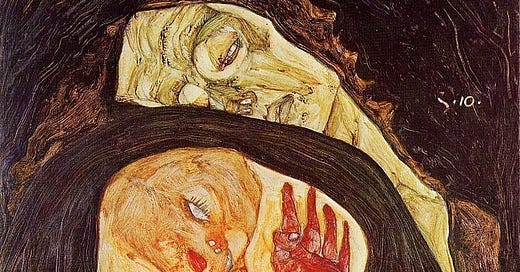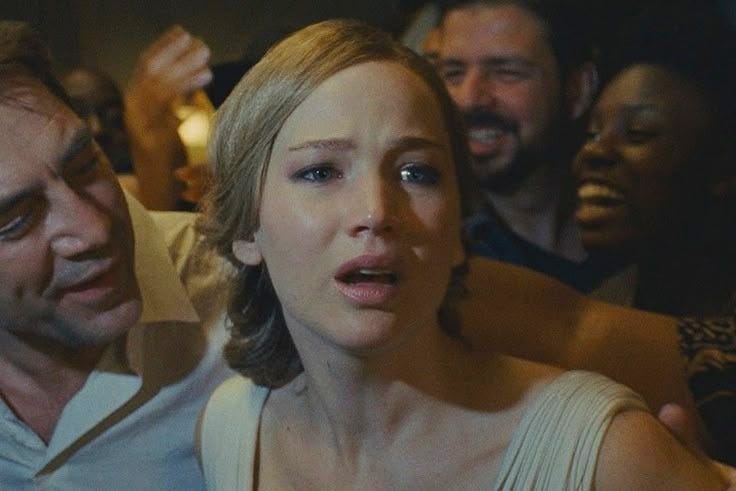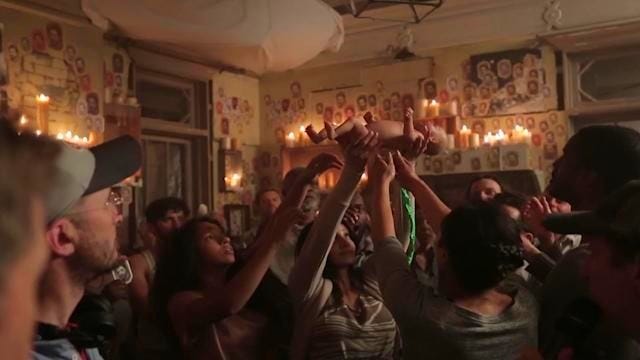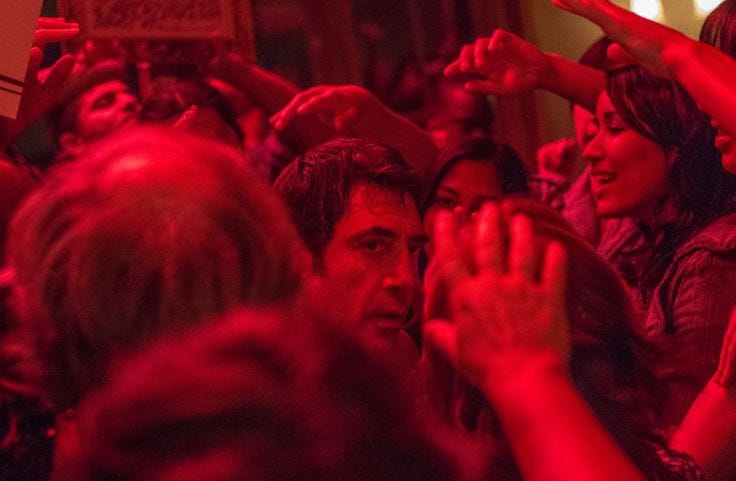Common amongst all jobs that help to uphold modern day society is the recognition that there are of course, both benefits and pitfalls. In the financial sector, everyday stress and a lack of self-actualisation are considered worthy trade-offs for financial stability and a regulated lifestyle. For social workers and humanitarians it is almost exactly the opposite, where the most dedicated are fulfilled by the work they do; a seemingly worthy trade off for little money and unpredictability. The soldier risks his life in the name of nationalist pride just as the sex worker risks hers to adequately support herself. For the athlete, the damage to one's body is just about worth the feeling of winning, and the representation of one's families or native countries, and for the artist, the lack of privacy and constant criticism is worth being able to share a gift, inspiring the minds of non-artists everywhere. Though this isn’t true of every artist, as has been this week's discursive topic following Chappell Roan’s appearance on Alex Cooper’s Call her Daddy podcast. Frankly, I don’t care to add to the mountain of discourse surrounding her self-centeredness regarding celebrity activism as I have nothing new to add and especially because those of you who have taken the time to read just one or two of my other pieces on here likely know where I’d stand on this.
Some discourse I don’t mind adding to concerns what she had to say about motherhood, starring some of our societies’ most forgotten labourers. This unpaid work constitutes a job that lasts the rest of her life, and whilst in many cases (though not all), she chose this, so many are ignorant to where the ‘trade-offs’ outweigh the benefits almost 100 to 1.
So then, despite the embellishment found in Chappell Roan’s, “All of my friends who have kids are in hell” comment, paired with “I literally don’t know anyone with kids who is happy at this age”, the frustrations thrown her way for her protestations against motherhood are largely unfounded. It goes without saying that there are plenty of happy mothers walking around, and a good number of young and happy mothers walking alongside them, so you might say the generalisation on Roan’s part was a little… over dramatised. Still, the disproportionate response is certainly interesting, especially where her dramatisation was self-evident, as well as the fact that I thought we’d begun to unveil some harsh realities about motherhood.
It’s like a kind of instinctive reflex now. One woman paints a picture of miserable mothers everywhere, and women around the world (both mothers and childless women), fight to prove her wrong, like she’s shattered a fable next to the remnants of likened fables that ‘Santa is real’ and ‘So is the tooth fairy!’. It’s true what she said doesn’t paint a holistic view of motherhood, but where we’re used to hearing the fantasy and not the nightmare version, and the scales have remained tipped firmly to one side, her generalisation (on the complete opposite side), helps to balance things out a bit.
So whilst Chappell Roan was the mouthpiece for seemingly harsh talking points, the reactions tell me that people are utilising her as a face to hurl projections at, when in reality she merely represents the growing realisation and society wide acceptance that motherhood is intrinsically hard. One doesn’t have to be a mother to know that motherhood is hard both physically and mentally any less than it is hard because of what society has and continues to demand of mothers, and the stereotypes attached to less than ‘perfect’ mothers.
Mother! (2017)
To this day, one of my favourite psychological thrillers has to be Aronofsky’s Mother!, starring Jennifer Lawrence. In the film, Lawrence’s character, a young woman whose seemingly peaceful life with her husband, and renowned poet (played by Javier Bardem) in a remote home is shattered when another couple (Ed Harris and Michelle Pfeiffer) arrives. As tensions rise and disturbing events unfold, Mother becomes increasingly paranoid, particularly as her husband’s obsession with attention distracts him from their child-to-be, beginning to reveal surreal truths about her surroundings. In the film we see the nightmares of motherhood unfold, blending with her reality, spiraling into an intense climax with a devastating endnote. Because the genre demands this, there are many theories as to what the movie serves as a metaphor for, ranging from a cautionary tale about environmental destruction to a play on Genesis’ creation story. When I undoubtedly rewatch the film, I’ll make sure to watch through a lens that considers each of these. But on the surface, the film makes sure to portray the realities of where motherhood brings along with it; societal, mental and physical hardships.
Theoretically, giving up everything for a child you chose to have might not be controversial assuming the load is split equally. But so far, it is the exact lack of gender equality in heterosexual relationships when it comes to raising children that dictates Mother sacrifice her personhood, where she’ll not only begin her job at raising baby, but will likely have to continue homemaking at the same time. This of course leaves very little room for Mother, and save for the occasional ‘Mums with babies’ forum or support group, society says this is how things ought to be. We see this illustrated in the film's main storyline, where Mother’s husband continues to pursue a creative career whilst professing his excitement for their child every now and then. On the other hand, Mother (who much to the point is never even given a name in the movie), is shown dedicated to renovating and decorating their home before the pregnancy, and after discovering she is pregnant, devotes her life to the baby all the while, leaving no time for herself.
The societal struggles of motherhood sit there waiting to be acknowledged before we even begin to talk about the mental hardships it invokes.
In the UK, “More than 1 in every 10 women within a year of giving birth experiences postpartum depression” according to NHS statistics, and women facing postpartum depression are largely stigmatised. According to a paper by Maternal Mental Health Alliance, young mothers find themselves “hiding symptoms of postnatal depression as they’re afraid to be judged as being unable to cope with their parenting responsibilities and fear their child may be taken away”.
Even beside those facing severe symptoms of postpartum depression and/or psychosis, the very fact of motherhood, where one becomes responsible for not only themselves but a vulnerable spirit from the moment it draws breath, is frightening enough. In Aronofsky’s Mother!, there is a devastating scene toward the end where Mother has to defend her newborn baby from what seems like the whole world, with countless reckless hands reaching for her child and her husband standing idly by as they threaten to destroy it.
Regarding the physical hardships of motherhood, I alongside so many other girls realising the risks take issue with the very limited information fed to us during sex education at school. For the most part, the story sounded something like “Sex, pregnancy, and oh yeah, birth is difficult”, which somehow managed to omit some of the most crucial details about pregnancy and motherhood. Looking back this feels intentional of course, where ‘The Girl With the List’ on TikTok committed a kind of revolutionary act by documenting a myriad of pregnancy and labour horror stories to share with us all. 300+ potential complications later, and so many of us are second guessing what may have felt inevitable before. The many complications ranging from vaginal tearing to preeclampsia are readily available for the average woman, not to mention where biases in westernised medicine make childbearing even more worrisome for fat, black and disabled women.
If it has to be said, I'm honestly not trying to play the role of fearmonger, but I would hardly be surprised were some of you to take it this way, given how sharing the realities of motherhood contests everything we’ve been taught about having children. But like that cliched trope in film where the expositional character tells our protagonist to “Forget everything they know about said thing”, learning about motherhood in an unvarnished way feels the same.
Beyond the hardships most mothers face, there is also the fact that controversially, the decision to create or not to create is actually an ethical dilemma (or should be), particularly given the state of the world, which I think is part of what dissaudes Gen-Z women and girls from becoming mothers other than the already discussed societal, mental and physical challenges.
Primarily, we can look at the cost of living crisis as a valid reason for not wanting to have children, where a lot of people don’t feel comfortable bringing children into a financially unstable environment. This of course doesn’t apply to marginalized communities without access to birth control, but is moreso a conversation about the average middle class woman presented with two paths down the line, who finds herself slipping into the ‘lower class’ as the middle class disappears completely.
Then there are feelings of guilt surrounding bringing a child into a world on the brink of war plagued by the political and civil unrest brought about by western governments, on land where the trees are burning and the seas are drying up because of those same governments who still find time to erode civil liberties left right and centre, which could be a concern when you consider that you actually don’t know if your child will face discrimination unless of course you do on account of something like race.
And then there is the fact that after so many of us have spent and will spend our youth unpacking and reversing generational trauma, that we don’t actually want to hold the responsibility of raising another child where we’ve seen how even the most well-intentioned parents can damage their kids.
When you zoom in to the picture in this way past mere conceptions of motherhood influenced by the fairytales we’ve been told, Chappell Roan’s association of motherhood with hell doesn’t seem altogether dramatised anymore.
Where there will always be trade-offs, we deserve to know what they are so that those of us who can choose motherhood do so knowing that for you, it’s all worth it anyway. Still, I will always advocate for a reformed, more accurate depiction of motherhood, where a society that recognises its hardships affords more respect to both mother and child, realising the sheer impact of creating life.
This just in! The tooth fairy is dead, and motherhood is hard.
Asisa









Absolutely LOVED THIS THANK YOU THANK YOUU
i really loved this, especially the way you approach motherhood and its struggles with so much understanding and grace - which can be lost in present conversations around the ethics of pregnancy/parenting.
“Still, I will always advocate for a reformed, more accurate depiction of motherhood, where a society that recognises its hardships affords more respect to both mother and child, realising the sheer impact of creating life.” i loved how you ended it